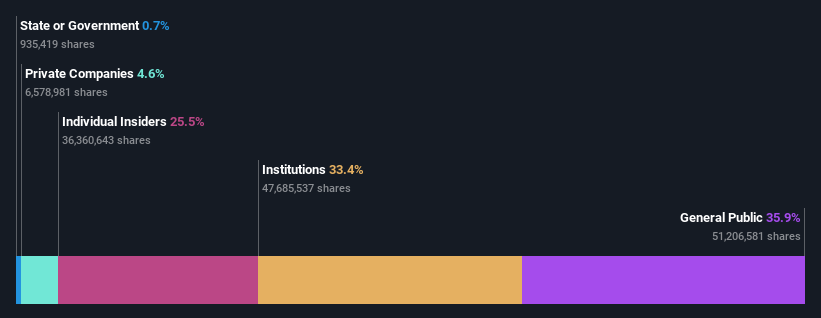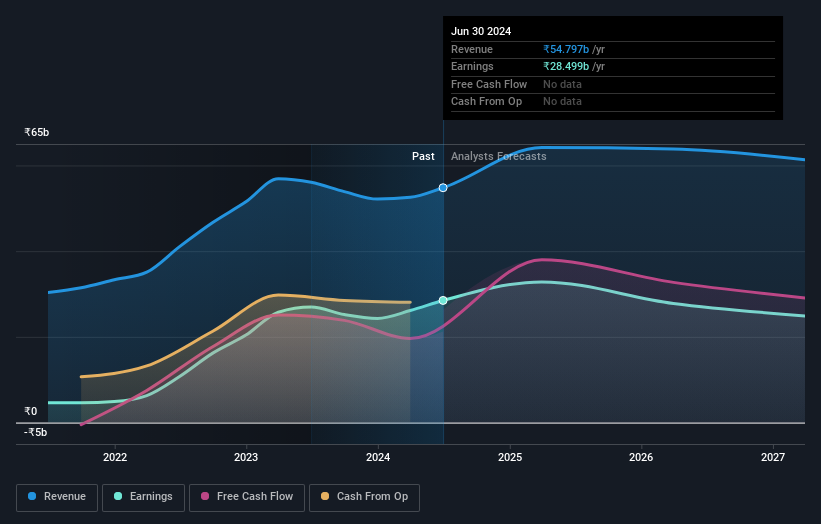- India
- /
- Oil and Gas
- /
- NSEI:GESHIP
The Great Eastern Shipping Company Limited (NSE:GESHIP) most popular amongst individual investors who own 36% of the shares, institutions hold 33%

Key Insights
- Great Eastern Shipping's significant individual investors ownership suggests that the key decisions are influenced by shareholders from the larger public
- A total of 12 investors have a majority stake in the company with 51% ownership
- 25% of Great Eastern Shipping is held by insiders
To get a sense of who is truly in control of The Great Eastern Shipping Company Limited (NSE:GESHIP), it is important to understand the ownership structure of the business. We can see that individual investors own the lion's share in the company with 36% ownership. In other words, the group stands to gain the most (or lose the most) from their investment into the company.
Meanwhile, institutions make up 33% of the company’s shareholders. Generally speaking, as a company grows, institutions will increase their ownership. Conversely, insiders often decrease their ownership over time.
Let's delve deeper into each type of owner of Great Eastern Shipping, beginning with the chart below.
View our latest analysis for Great Eastern Shipping

What Does The Institutional Ownership Tell Us About Great Eastern Shipping?
Many institutions measure their performance against an index that approximates the local market. So they usually pay more attention to companies that are included in major indices.
As you can see, institutional investors have a fair amount of stake in Great Eastern Shipping. This suggests some credibility amongst professional investors. But we can't rely on that fact alone since institutions make bad investments sometimes, just like everyone does. It is not uncommon to see a big share price drop if two large institutional investors try to sell out of a stock at the same time. So it is worth checking the past earnings trajectory of Great Eastern Shipping, (below). Of course, keep in mind that there are other factors to consider, too.

Hedge funds don't have many shares in Great Eastern Shipping. Looking at our data, we can see that the largest shareholder is Ravi Sheth with 12% of shares outstanding. For context, the second largest shareholder holds about 11% of the shares outstanding, followed by an ownership of 5.2% by the third-largest shareholder. Bharat Sheth, who is the second-largest shareholder, also happens to hold the title of Chief Executive Officer.
Looking at the shareholder registry, we can see that 51% of the ownership is controlled by the top 12 shareholders, meaning that no single shareholder has a majority interest in the ownership.
While studying institutional ownership for a company can add value to your research, it is also a good practice to research analyst recommendations to get a deeper understand of a stock's expected performance. While there is some analyst coverage, the company is probably not widely covered. So it could gain more attention, down the track.
Insider Ownership Of Great Eastern Shipping
The definition of company insiders can be subjective and does vary between jurisdictions. Our data reflects individual insiders, capturing board members at the very least. Company management run the business, but the CEO will answer to the board, even if he or she is a member of it.
Most consider insider ownership a positive because it can indicate the board is well aligned with other shareholders. However, on some occasions too much power is concentrated within this group.
Our most recent data indicates that insiders own a reasonable proportion of The Great Eastern Shipping Company Limited. It has a market capitalization of just ₹185b, and insiders have ₹47b worth of shares in their own names. That's quite significant. Most would be pleased to see the board is investing alongside them. You may wish to access this free chart showing recent trading by insiders.
General Public Ownership
With a 36% ownership, the general public, mostly comprising of individual investors, have some degree of sway over Great Eastern Shipping. This size of ownership, while considerable, may not be enough to change company policy if the decision is not in sync with other large shareholders.
Private Company Ownership
Our data indicates that Private Companies hold 4.6%, of the company's shares. It's hard to draw any conclusions from this fact alone, so its worth looking into who owns those private companies. Sometimes insiders or other related parties have an interest in shares in a public company through a separate private company.
Next Steps:
While it is well worth considering the different groups that own a company, there are other factors that are even more important. To that end, you should learn about the 3 warning signs we've spotted with Great Eastern Shipping (including 1 which is potentially serious) .
Ultimately the future is most important. You can access this free report on analyst forecasts for the company.
NB: Figures in this article are calculated using data from the last twelve months, which refer to the 12-month period ending on the last date of the month the financial statement is dated. This may not be consistent with full year annual report figures.
New: Manage All Your Stock Portfolios in One Place
We've created the ultimate portfolio companion for stock investors, and it's free.
• Connect an unlimited number of Portfolios and see your total in one currency
• Be alerted to new Warning Signs or Risks via email or mobile
• Track the Fair Value of your stocks
Have feedback on this article? Concerned about the content? Get in touch with us directly. Alternatively, email editorial-team (at) simplywallst.com.
This article by Simply Wall St is general in nature. We provide commentary based on historical data and analyst forecasts only using an unbiased methodology and our articles are not intended to be financial advice. It does not constitute a recommendation to buy or sell any stock, and does not take account of your objectives, or your financial situation. We aim to bring you long-term focused analysis driven by fundamental data. Note that our analysis may not factor in the latest price-sensitive company announcements or qualitative material. Simply Wall St has no position in any stocks mentioned.
About NSEI:GESHIP
Great Eastern Shipping
Through its subsidiaries, engages in the shipping and offshore businesses in India and internationally.
Flawless balance sheet, undervalued and pays a dividend.
Market Insights
Community Narratives




